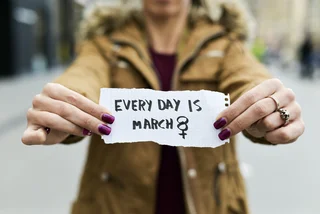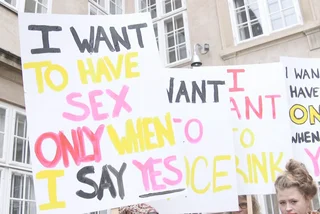Activists in Prague will rally on Thursday to combat sexual and domestic violence, calling on the Czech government to address the alarming prevalence of these crimes and improve the justice system's response.
A mission to raise awareness
The demonstration is being organized by Bez Trestu (Without Punishment), an organization devoted to ending the trivialization of sexual and domestic violence which frequently occurs in Czech courts. Kristýna Benešová, the co-founder of Bez Trestu, spoke with Expats.cz about the troubles women currently face in Czechia.
"The majority of Czechs still claim that childcare is a woman’s job while men should provide for the family. In this landscape, violence against women is more prevalent," according to Benešová.
"Some judges are still caught in stereotypical ideas about intimate violence – for example, the idea that the behavior of the victim was risky or provocative and that she/he contributed to the crime," she notes. Benešová added that, in the Czech Republic, the persistence of traditional gender roles contributes to the prevalence of violence against women.
No more bias, shame, and victim-blaming
She adds that traditional gender roles negatively affect men as well. "Violence against men is even more underreported than sexual violence against women. To be a male victim is in huge contrast with the stereotypical idea about a strong man. It effectively stops men from reporting these crimes."
According to Bez Trestu data, 50 percent of perpetrators of sexual violence in Czechia receive suspended sentences, enabling them to avoid imprisonment. These figures only reflect reported cases, with the majority of incidents going unreported. The organization estimates that up to 12,000 rapes occur annually in the country, but a mere 5 percent are officially reported.
Organizations like Bez Trestu aim to draw attention to harmful beliefs via social awareness campaigns that highlight real-life cases and expose the influence of myths and biases surrounding victims, perpetrators, and sexual offenses.
Benešová said the group also wants to foster discussion within the Czech government about mandatory education for state officials on victimology, victim psychology, and the societal context of sexual and domestic violence.
"The Czech Republic needs compulsory education in victimology for judges and professionals dealing with victims of rape and domestic violence. It would prevent the downplaying [of the attack] within the judicial system," she explains.
Failure to ratify Istanbul Convention
Thursday's demonstration follows discussions of the ratification of the Istanbul Treaty planned for Wednesday's session of the Chamber of Deputies. The Czech Republic is among the six remaining European countries not to have ratified the convention, the text of which views violence against women as a violation of human rights and discrimination.
"We are waiting for the ratification of the Istanbul Convention since 2016. I see it as a political failure to uphold women’s rights and rights of victims of domestic violence," said Benešová.
Once the ratification of the treaty is approved in the Chamber of Deputies, the lower house of parliament, it must be approved by a simple majority in the Senate, after which the president must sign. According to iRozhlas, 10 out of 18 members of the Senate would vote for the ratification of the Istanbul Convention.
The Istanbul Convention serves as a crucial indicator of a society's commitment to women's support. "If we know that every third woman has experience with sexual or domestic violence, it is up to the government to publicly proclaim that this is the problem we need to solve," said Benešová.
Women's rights advocates like Benešová say the failure to ratify the Istanbul Convention isn't the only way in which the Czech government lags behind other countries in its approach to sexual violence.
A change to the law
"Czech law still assumes that rape involves violence or at least the threat of violence and that the victim must actively defend herself. However, we know from practice that the victim often does not fight back. They have various reasons for staying passive – fearing for their lives, freezing, or protecting children who might be sleeping next door. All are natural reactions and we cannot expect self-defense from victims of rape. The absence of consensual sex is sufficient to establish rape. The new definition has to center around consent."
The protest will commence at 5:30 p.m. on June 15, with protestors gathering at Palackého náměstí in Prague. Participants will address the current state of the justice system's handling of sexual and domestic violence before embarking on a march through Náplavka and Svobodova Street, ending at the Ministry of Justice in Vyšehradská.
Demonstrators will walk in silence with bound hands to symbolize survivors' entrapment within the criminal justice system and the struggle to achieve adequate justice.
Last week it was widely reported that the Chamber of Deputies would discuss ratification of the Istanbul treaty at its Wednesday meeting. The issue was not mentioned on the official agenda of the session for this Wednesday.
Don't suffer in silence
- ProFem offers legal help, intervention, and online counseling in English.
- Rosa centrum offers online chat, crisis prevention, and internet counseling.
- Acorus provides a secret shelter and social counseling for victims of domestic violence.
- Bílý Kruh Bezpečí offers a free, non-stop helpline for victims.
- The 116 006 line has been serving victims of crimes and domestic violence in the Czech Republic since January 2015. It is available 24/7.












 Reading time: 4 minutes
Reading time: 4 minutes 








 English
English
 German
German
 Hungarian
Hungarian
 French
French
 Dutch
Dutch























